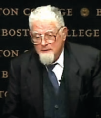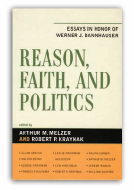Former students offer tribute to Professor Dannhauser
Former students offer tribute to Professor Dannhauser
 In the late Sixties, Cornell's government department was a stronghold for the teaching of political philosophy, with a faculty that included Allan Bloom, Walter Berns, and Werner Dannhauser—all of whom had studied with Leo Strauss at the University of Chicago. They attracted a strong following of devoted undergraduates and graduate students, and many of these "disciples" have gone on to become academics. Several years ago, two of them— Robert Kraynak '71, who has taught at Colgate for thirty years, and Arthur Melzer '71, a professor at Michigan State—hatched the idea of assembling a volume of essays as a tribute to Dannhauser. They contacted Berns and eight of their fellow Cornellians and invited them to contribute.
In the late Sixties, Cornell's government department was a stronghold for the teaching of political philosophy, with a faculty that included Allan Bloom, Walter Berns, and Werner Dannhauser—all of whom had studied with Leo Strauss at the University of Chicago. They attracted a strong following of devoted undergraduates and graduate students, and many of these "disciples" have gone on to become academics. Several years ago, two of them— Robert Kraynak '71, who has taught at Colgate for thirty years, and Arthur Melzer '71, a professor at Michigan State—hatched the idea of assembling a volume of essays as a tribute to Dannhauser. They contacted Berns and eight of their fellow Cornellians and invited them to contribute.
The result was Reason, Faith, and Politics, published by Lexington Books. The book's eleven essays address a wide range of subjects united by the theme expressed in the title: the debate between philosophy and religion as expressed in politics, which Strauss had emphasized in his teachings about Athens and Jerusalem as the sources of the Western tradition.
Dannhauser, says Kraynak, was "not only a teacher—he was one of those teachers who could be your friend, without being your buddy in some sort of vulgar sense. And we all stayed closely in touch with him over the years." In the book's introduction, Kraynak offers an affectionate portrait of Dannhauser, noting that many of his students "were transfixed by a chain-smoking man in rumpled clothes whose shaggy goatee and large head made him look like a cross between an old-world professor and a mythical satyr."
 In the aftermath of the Straight takeover in 1969, Bloom and Berns left Cornell, citing their profound displeasure over the resolution of that crisis. Dannhauser stayed on the Hill until 1992 and then taught at Michigan State, at Melzer's invitation, before retiring from the classroom. "We decided we wanted to do this while Werner was still alive, as many of these volumes are done posthumously," says Kraynak. "We got together with him and had a party to celebrate its publication."
In the aftermath of the Straight takeover in 1969, Bloom and Berns left Cornell, citing their profound displeasure over the resolution of that crisis. Dannhauser stayed on the Hill until 1992 and then taught at Michigan State, at Melzer's invitation, before retiring from the classroom. "We decided we wanted to do this while Werner was still alive, as many of these volumes are done posthumously," says Kraynak. "We got together with him and had a party to celebrate its publication."
In recent years, the so-called Straussians have acquired a degree of notoriety because of their association with the neoconservatives of the Bush Administration, but this relationship has often been misrepresented. In this volume, Francis Fukuyama '74 writes: "The idea of a Straussian influence gained currency only because Paul Wolfowitz '65, the deputy secretary of defense, studied briefly with Strauss and with Allan Bloom, who was himself a student of Strauss. But Wolfowitz never considered himself a Strauss protégé. . . ." Fukuyama goes on to say that Strauss "did not produce doctrine in the sense that Marx and Lenin did, and it is extraordinarily hard to extract from his writings anything that looks like public policy analysis."
In any case, Reason, Faith, and Politics stands as a unique monument to an academic epoch at Cornell, and to the enduring influence of one professor on a new generation of teachers. Says Kraynak: "In the Sixties and early Seventies, there was a group of professors and students who were affiliated with Leo Strauss and tried to study political philosophy based on the great books of the Western tradition. This is the legacy of that group—and I regret that this school of thought is no longer represented at Cornell."
— Jim Roberts '71


